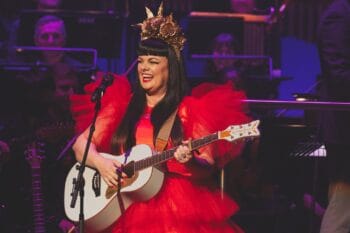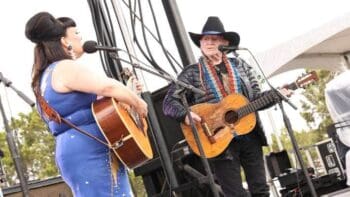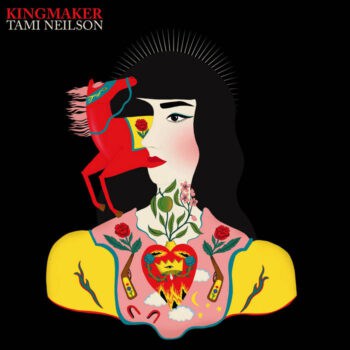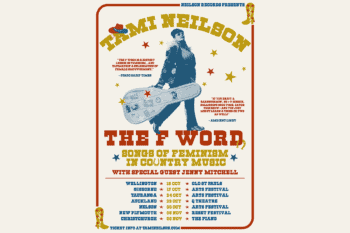Tami Neilson Is A Kingmaker: 13th Floor Interview
Tami Neilson is on top of the world. Her new album, Kingmaker is a game changer and her show with the APO was among the year’s best. So what’s next?
The 13th Floor’s Marty Duda spoke to Tami and unashamedly gushed about how wonderful she is. But then we get down to the nitty gritty… The “F” Word and why women have been locked out of Country radio…thoughts on Brandi Carlile and Joni Mitchell and taking over America.
Click here to listen to the interview:
Or, read along with the transcript:
MD: I wanted to start talking about, because I just saw your show with the APO, and it was like the best show of the year.
 TN: Awww thank you.
TN: Awww thank you.
MD: One of the things that I realized when I was at the show, and when I was writing the review was your amazing ability to give coherent discussion and talk in between song banter. I mean, let’s face it, Kiwis are never pretty good at that, there’s a lot of ummming and ahhhing and mumbling, but you are like spot on. I mean, do you practice that?
 TN: (Bursts out laughing) No, I’m just really good at talking. I have lots of practice talking. Yeah, I mean, I think when you are first, you know, performing an album like this is the first time we’ve performed it, so normally, you don’t have you’re kind of…over time you get your banter and your patter between songs. But of course, we’ve only just started you know, performing this album. But I think that a lot of it has to do with doing things like this, doing interviews, and people are asking about each song. And so you kind of you have the story that goes with each song already naturally. So I think it’s kind of just condensing that down. But I think it’s, I mean, years of growing up in the music business and watching my parents on stage. My dad…I’m kind of this crazy mix of my parents when it comes to my onstage banter, because my dad was a comedian, a professional comedian.
TN: (Bursts out laughing) No, I’m just really good at talking. I have lots of practice talking. Yeah, I mean, I think when you are first, you know, performing an album like this is the first time we’ve performed it, so normally, you don’t have you’re kind of…over time you get your banter and your patter between songs. But of course, we’ve only just started you know, performing this album. But I think that a lot of it has to do with doing things like this, doing interviews, and people are asking about each song. And so you kind of you have the story that goes with each song already naturally. So I think it’s kind of just condensing that down. But I think it’s, I mean, years of growing up in the music business and watching my parents on stage. My dad…I’m kind of this crazy mix of my parents when it comes to my onstage banter, because my dad was a comedian, a professional comedian.
MD: Oh, I didn’t know that.
TN: Yeah, so watching that skill, throughout my life, you know, that’s very much like, you know, nailing your banter and making it really concise. And so I definitely have that. And my mom was a school teacher. And so having that mix of the two…the mum would kind of  tell the, you know, the facts and the and the practical stuff, and Dad would add the humor, and she was kind of the straight man to his comedy. So I think growing up watching that, I’ve always, for me, every artist is different. You know, like Willie Nelson is a perfect example. He’s like, ‘people don’t come to hear me talk, they come to hear me sing’, and so he makes a point of not talking. And so he can get in as many songs as possible. I’m like the opposite to that! I guess for me, growing up with a father who was a professional comedian, I watched that be just as important a part of the show as the music. So I think that’s always been a really important part for me, my kind of, you know who I am as an artist. Everyone’s different.
tell the, you know, the facts and the and the practical stuff, and Dad would add the humor, and she was kind of the straight man to his comedy. So I think growing up watching that, I’ve always, for me, every artist is different. You know, like Willie Nelson is a perfect example. He’s like, ‘people don’t come to hear me talk, they come to hear me sing’, and so he makes a point of not talking. And so he can get in as many songs as possible. I’m like the opposite to that! I guess for me, growing up with a father who was a professional comedian, I watched that be just as important a part of the show as the music. So I think that’s always been a really important part for me, my kind of, you know who I am as an artist. Everyone’s different.
MD: So it really helps you connect with the audience, and them to connect with what you’re singing about, because you’ll give the backstory to pretty much everything in a coherent fashion
TN: Well thank you
MD: When did this album start to formulate in your mind?
 TN: Um, I guess it started probably about a year before the album came out. So it’s usually a process of, you know, the little bits and pieces that you gather. I often say it’s like, you know, saving all these little ingredients that come to you whether it’s snippets of melodies or lyrics or you know, any ideas that you kind of…I put them in my voice memos on my phone and, and then when it comes time to kind of write a project, you’re, you’re gathering all these ingredients that you’ve kind of collected over the last while. But this album was definitely informed by being in lockdown and in and out of lockdowns being a musician who couldn’t tour. You know, it was a different way of creating than I’ve ever had because normally I’m kind of slotting things in. I remember writing the Chicka Boom! album, in a tour van, with headphones on, locking out the band all like joking around and stuff in the backseat. And I’m upfront, like writing. Because that was the time I had to do it was like in between touring and family life. So this was a very different way of approaching writing. It was still having stolen moments between like, home learning the kids, you know. I can specifically remember I was making dinner when Kingmaker kind of came to me, and quickly like getting my voice memo, while I’m like stirring with hand and like singing into my phone with the other, you know. But I think when you’re a parent of young kids that’s kind of the way that you’re forced to create. But yeah, I think that being in lockdown, and being in a pandemic, throughout the writing of this album, you know, informed the way this album was created in a way that none of my other albums have been.
TN: Um, I guess it started probably about a year before the album came out. So it’s usually a process of, you know, the little bits and pieces that you gather. I often say it’s like, you know, saving all these little ingredients that come to you whether it’s snippets of melodies or lyrics or you know, any ideas that you kind of…I put them in my voice memos on my phone and, and then when it comes time to kind of write a project, you’re, you’re gathering all these ingredients that you’ve kind of collected over the last while. But this album was definitely informed by being in lockdown and in and out of lockdowns being a musician who couldn’t tour. You know, it was a different way of creating than I’ve ever had because normally I’m kind of slotting things in. I remember writing the Chicka Boom! album, in a tour van, with headphones on, locking out the band all like joking around and stuff in the backseat. And I’m upfront, like writing. Because that was the time I had to do it was like in between touring and family life. So this was a very different way of approaching writing. It was still having stolen moments between like, home learning the kids, you know. I can specifically remember I was making dinner when Kingmaker kind of came to me, and quickly like getting my voice memo, while I’m like stirring with hand and like singing into my phone with the other, you know. But I think when you’re a parent of young kids that’s kind of the way that you’re forced to create. But yeah, I think that being in lockdown, and being in a pandemic, throughout the writing of this album, you know, informed the way this album was created in a way that none of my other albums have been.
MD: So to me, because I’ve been following your career for a bit of time, when I first heard it, it was just seemed to me it was a game changer. It’s gone to another level. Was that in your mind when you were making the record? Or did it be become that do you think? Or it has become that for you?
TN: Yeah, well you know, as I said, like, creating this album and in a way that I’ve never had the time or the resource, you know, even things like, financially, that’s, that’s a restriction for artists. You know, not being able to afford a string section ever, or you know. And that again, you know, COVID, giveth and COVID taketh away. And one of the things that gave was, even though I was not able to tour, I was able to kind of do some work in pockets between lockdowns within New Zealand. And New Zealand is where I have my most successful profile and audience and so there was the income from those things. But I didn’t have any of the…normally I’m in the red all the time from touring overseas. I mean, we know as people who reside in New Zealand, that even leaving the country is so cost prohibitive for making anything on a tour. So when you’re, you know, it used to be I fly my whole band, and then I’d start flying just myself and picking up musicians on the ground, trying to make it sustainable. So the reality is, I was always like 10s and 10s of 1000s of dollars, you know, in the red, just trying to invest in my overseas touring market. And suddenly, I thought, you know, that that was one of the restrictions kind of lifted because normally it’s all based around live touring. And because that was removed not only did I not have the income from it, but international touring, I didn’t have that kind of black hole eating up all of my resources and my time. And so that was a silver lining actually, was that I thought, you know, the album that I’ve always wanted to make, I can make it. If I can’t tour the world, then I’m going to make an album that can tour it for me. Because for the foreseeable future, it did not look like we will be getting any there anytime soon. So that in another restriction I never really realized, that I put on myself was live shows were always that was always number one. Albums were to supplement the live shows. It was like, ‘and here’s a souvenir to take home of a show’. And I always kind of put this restriction on myself, like, if I can’t recreate it live, then it’s not going on the album, because I don’t want people to be disappointed when I play live.. And so I made albums specifically like lo-fi so that I could recreate that and people would be like, ‘this is what I came to here’. And so having the live touring scenario, completely removed from the equation, out of no control of our own musicians around the world, it surprisingly freed me creatively to suddenly be like, ‘Oh, now the sky’s the limit. I can make the album I’ve always wanted to make. I don’t need to worry about recreating it live’. Of course now I’m like completely screwed because now I do.
MD: Well, you did good so far.
TN: Well, I mean, it’s not every show you get a full orchestra. But it’s been interesting, because you know, as fan, if there’s an artist that I see, I don’t expect it to sound exactly like the album. In fact, I like when it doesn’t.
MD: You want it to be different
TN: Yeah, it’s like, I’m if I wanted to hear the record, I can listen to that at home. I want something different.
MD: All right. So with that in mind, there’s kind of an overarching theme to the album about feminism and women’s place, especially in the country music, and radio, and all that, was that heavily on your mind or the deck has kind of come through as you were starting the writing process. Did you kind of go in with that in mind?
 TN: Yeah. Well, I think that at the time I wrote the album. Alongside that I was writing another project. I was writing a show called The F Word. songs of feminism and country music. And so while I was writing that show, with Dr. Jada Watson, she’s a professor of musicology at the University of Ottawa who specializes in the data research of gender representation on country music or the lack thereof. And of people of color on country radio, which is even more dire statistics. And so working with her and telling these stories of everyone from Dolly Parton to Loretta Lynn, to today, you know, Brandi Carlile, and The Chicks being blacklisted from country music, you know, and telling the story of these women and the adversity they faced. And then the statistics, you know, like, seeing that in 2021, only 13% of country music radio is made up of women. And this is across the United States. Like this is where country is king, you know. So it’s working alongside…you know, while I wrote this album, I think it most definitely informed you know, what I was writing about the songs and I mean, I tend to write about my lived experience, whether it be family and loss and love, as most artists do, and my experience is one of a female in the music industry. And so that’s what I write about and that’s kind of what came through and I think that a really beautiful way of… and I think you reference to this in your review of the album… was having Jada then write the liner notes for Kingmaker was kind of this beautiful way of like, it coming full circle. And it tying in, you know, the work that we’ve done. And this, this was kind of the culmination of that.
TN: Yeah. Well, I think that at the time I wrote the album. Alongside that I was writing another project. I was writing a show called The F Word. songs of feminism and country music. And so while I was writing that show, with Dr. Jada Watson, she’s a professor of musicology at the University of Ottawa who specializes in the data research of gender representation on country music or the lack thereof. And of people of color on country radio, which is even more dire statistics. And so working with her and telling these stories of everyone from Dolly Parton to Loretta Lynn, to today, you know, Brandi Carlile, and The Chicks being blacklisted from country music, you know, and telling the story of these women and the adversity they faced. And then the statistics, you know, like, seeing that in 2021, only 13% of country music radio is made up of women. And this is across the United States. Like this is where country is king, you know. So it’s working alongside…you know, while I wrote this album, I think it most definitely informed you know, what I was writing about the songs and I mean, I tend to write about my lived experience, whether it be family and loss and love, as most artists do, and my experience is one of a female in the music industry. And so that’s what I write about and that’s kind of what came through and I think that a really beautiful way of… and I think you reference to this in your review of the album… was having Jada then write the liner notes for Kingmaker was kind of this beautiful way of like, it coming full circle. And it tying in, you know, the work that we’ve done. And this, this was kind of the culmination of that.
MD: Right. And it doesn’t seem like really country music as the business is changing. Like you say 2021 is the same. So you’re going to be at this Americana Fest thing in Nashville, which I’m going to as well and very excited about. Is that a way of like working around that system by just changing what you consider you call yourself? Or where are you? Where are you put yourself instead of country on Americana, or folk or hip hop or whatever it is? Is that is that a way of working around that established system?
TN: Yeah, I think that Americana music in general, is, you know, it’s that classic thing of like, not being…these are people and artists and industry people that are not being offered a seat at the table of the country music industry. And so they’re building their own table, and building their own industry outside of that. And so it’s, it’s something that, you know, has to be done. I don’t have a lot of hope for the industry itself changing because they are benefiting too much from oppressing women and people of colour. Why would they, they wouldn’t have any motivation to change what’s working for them and making them a lot of money. Kind of the perfect example of the white supremacist roots of country music, which I mean, we all kind of already know that, but to see it reflected, you know, an artist, a male artist, who was all over the news for, you know, being filmed using a racist slur, the infamous ‘N’ word. His sales rocketed after he did that. And he is like the number one selling artist in America. I’m talking Beyonce, Adele, I’m talking everybody. And that is a sad testament to how the industry itself is not going to do anything about that kind of success. No matter what it comes, why it comes, you know?
MD: So you mentioned Brandi Carlile. Did you see the Joni Mitchell thing?
https://youtu.be/4aqGjaFDTxQ
TN: Oh, my gosh, I cried for like the entire day. I just watched it on loop and cried. Man, yeah. Brandi is one of those artists that transcends just music, you know., Like she uses her platform and always has, to elevate other women, queer artists, people of colour, anyone who’s kind of unwelcome in the mainstream music business. She elevates them and then to see, you know, her honouring Joni like that and getting to this point, you know, Joni, having had the health issues and an aneurysm and not being able to perform. And I don’t think a lot of people realize what an integral part Brandi has played in the rehabilitation of her even getting the confidence to sing and perform. You know, she reached out to her and, and she’s been for years now hosting these Joni Jams at Joni’s house. And at first she did not even sing it. She just wanted to be surrounded with music again. And so it was always this amazing All Star roomful of people from Elton John to Paul McCartney dropping in and Brandi was hosting this. And it’s so beautiful, you know, she’s done it many times with producing Tanya Tucker’s recent album, which was nominated for Grammys. You know, Tanya was very much forgotten about and kind of almost kept out of the country music industry. And, you know, there Brandi was like plucking her out of you know, I would not say obscurity by any means about Tanya Tucker, but out of being unappreciated, or underrated and using her platform to lift and, and obviously, you know, people like Joni Mitchell and Tanya Tucker, are people that already have a massive platform and, you know, it’s not like Brandi is you know, I giving them a big shot or something!. But I love seeing that, you know, it’s the same thing that Elton did with Leon Russell. You know, it’s honouring, honouring the people that formed us as artists and making sure that they are continued to be honoured. And it was just so beautiful to see that in action.
MD: Yeah. So you are going to the States and you’re going to be performing. How is that going to work for you? Are you taking the band? Are you picking up people? Are you performing solo? What’s going? What’s the plan?
TN: Yeah. So at the moment, it’s yeah, I mean, it’s expensive at the best of times to take your whole band overseas right now. It’s, it’s almost impossible. Flights are like triple the cost right now. So I am flying, flying into Nashville. My brother Jay is going to meet me there. He’s always in my band when I perform internationally. And in this instance, we’re going to be picking up a drummer, and a guitarist who I haven’t played with yet. So that’s a bit it’s always a bit nerve racking. We’ll see how it goes. You’ll see how it goes. You’re gonna be there!
MD: I will see how it goes! I’ll be reporting back.
TN: Don’t make me nervous.
MD: No, no. I’m sure he’ll be fantastic. I think the week that that’s happening, Crowded House is playing in Nashville.
TN: Yeah, they’re on the Sunday night.
MD: So back to your music. You’ve got Kingmaker out. Are you thinking in terms of now? What am I going to? How do I follow that up? And what am I going to do next? I mean, you’ve got Willie Nelson, where do you go from there?
TN: Oh yeah, I’ve peaked. I’ve taken to retirement. It was nice talking to you. This is our last interview. Yeah, honestly, I just can’t even think because we’ve just released the album a few weeks ago. So I’m definitely still in the album cycle of like rolling it out, and kind of riding the wave of seeing how this all unfolds. And yeah, I guess we’ll see once that’s kind of come to its cycle of completion, which is hopefully a while from now.
MD: Yeah, well ,I love the record and I loved that show, it was mind boggling.
TN: Thank you.
MD: You talk about people weeping…people were weeping at that as well.
TN: There were definite moments where I had to rein it in. It’s overwhelming. I was so grateful that we had rehearsals. Because I could kind of let it out and get it out of my system. It’s overwhelming, like for so many reasons, but like performing with an orchestra, first of all, hearing the songs come to life live for the first time, being on stage with, you know, Victoria Kelly, who collaborated with me and wrote all of the arrangements. And who’s been such a part of this journey with me alongside me. And then, of course, my band, not having not played in a year, and here we are. So there were so many emotional levels. And then just the sheer power of an orchestra on stage with you is just…that’s emotionally overwhelming as a musician. And then like I did, there was a moment of losing it, where I had to kind of rein it in, was when I was introducing the song I wrote with my dad, I Can Forget. And just the thought of him hearing…what he would have felt hearing his song performed by an 80 piece orchestra, you know, it would have been a dream of his. So there were a lot of layers. I wish you know, I kind of feel like a wedding day where you’re in the eye of this whirlwind of joy and happiness, but it goes by and like this blur. And I wish I could experience the whole thing again, as an audience member to kind of just be able to absorb it. .
Click here for more Tami Neilson
- FINDMYKEYS – Be: 13th Floor New Song Of The Day - April 20, 2024
- New Music Friday: 13th Floor New Album Picks: April 19, 2024 - April 19, 2024
- JessB – Talk Of The Town: 13th Floor New Song Of The Day - April 19, 2024
